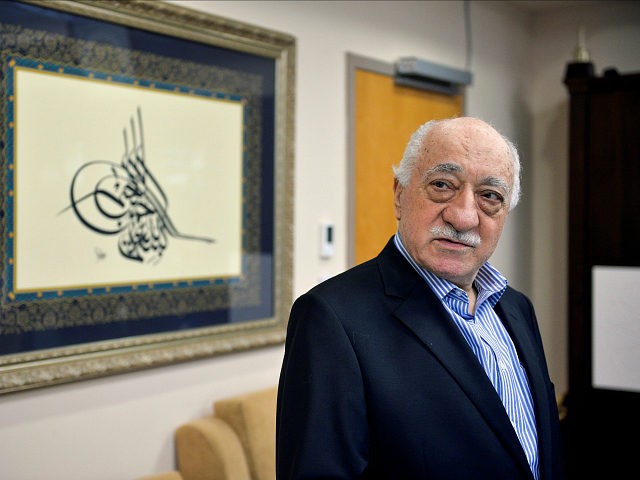An unnamed “senior U.S. State Department official” told reporters Tuesday that American law enforcement evidence suggests that Turkish Islamic cleric Fethullah Gulen operates his charter schools like an “organized crime” syndicate, not a religious group, and that Turkey’s demands to extradite Gulen for criminal activity “may have some merit.”
The government of Turkish President Recep Tayyip Erdogan has accused Gulen of orchestrating the failed coup d’etat defeated on July 15 and infiltrating the nation’s military, civilian law enforcement, and educational infrastructure to establish a “cult” to Gulen within Turkey.
The Turkish newspaper Hurriyet cites the unnamed official as saying that Gulen’s Hizmet Islamic organization operates “a lot like the ways in which organized crime sets itself up by folks who are trying to hide money for money laundering,” rather than what it presents itself as: “a benign religious movement.” He added that Turkey’s claims that Gulen, who lives in Pennsylvania, should be extradited for his role in the failed coup “may have some merit,” though he did not elaborate.
Hizmet supporters describe the movement as “a ‘faith-inspired collectivity’ with millions of followers and sympathizers who draw on Islamic spirituality and teaching, constituting one of the largest civil movements.” The movement operates more than 1,000 schools worldwide, including 150 in the United States, which operate on taxpayer subsidies. Gulen himself argues that Hizmet (“service”) is a moderate Islamic alternative that has a role to play in the eradication of radical Islam.
Gulen opponents, including the government of Turkey, argue that, instead, Hizmet is a cult centered around Gulen in which adherents are encouraged to aid in the overthrow of the Turkish government to establish Gulen as the nation’s leader.
The U.S. government has not weighed in officially on these accusations, though America’s Hizmet schools have run into problems of their own. The FBI raided 19 of the schools in 2014, citing discrepancies in the group’s finances.
The Turkish government has made multiple official requests for Gulen’s extradition, citing the July 15 coup attempt and comparing the Hizmet movement to the Church of Jesus Christ of Latter-Day Saints, calling them both “CIA projects.” Turkish Justice Minister Bekir Bozdag visited Washington last week to personally encourage his American counterpart Loretta Lynch to begin the extradition process.
In public comments, Bozdag compared Gulen to Osama bin Laden, citing him as an equivalent danger to the stability of the Turkish government. “Whatever Osama bin Laden means for the United States and the American people, Fethullah Gulen means the same for Turkey and the Turkish people,” he said, comparing the coup attempt to “an assassination attempt on President Obama and his family, where the White House was bombed [and] … tanks were marching the streets [and] … 241 U.S. civilians were killed and around 3,000 were wounded.”
While Turkey has sent thousands of files to Washington related to the Gulen case, by late August, American officials confirmed that none of those documents appeared to have anything to do with the failed coup. “The evidence is crystal clear. We know the terrorist cult responsible for the vicious attacks against us and the Turkish people. We simply cannot understand why the U.S. cannot just hand over this individual,” Turkish Prime Minister Binali Yıldırım said at the time, shortly before U.S. officials – and Turkish government spokespeople – confirmed that they had not yet compiled evidence linking Gulen to the coup.
Last week, Turkish officials said they finally handed over the relevant evidence regarding Gulen and the failed coup.
Meanwhile, the Turkish government has continued to crack down on individuals and media organizations it claims has an affiliation to Gulen. This week, Turkish police shut down 15 media outlets and arrested multiple senior staffers at the newspaper Cumhuriyet, the nation’s premier secularist opposition newspaper. Cumhuriyet grew to international recognition after facing government suppression for agreeing to publish a Turkish-language inset of the French satirical magazine Charlie Hebdo following a jihadist attack on its headquarters. Cumhuriyet later published a report accusing Turkey’s intelligence agency, the MIT, of supplying weapons to Syrian rebels. For that, the newspaper’s editor-in-chief, Can Dündar, received a five-year prison sentence. Dündar eventually escaped to Germany.
Turkey has arrested, detained, or fired from state jobs more than 100,000 people in relation to Gulen and the July 15 coup attempt.

COMMENTS
Please let us know if you're having issues with commenting.